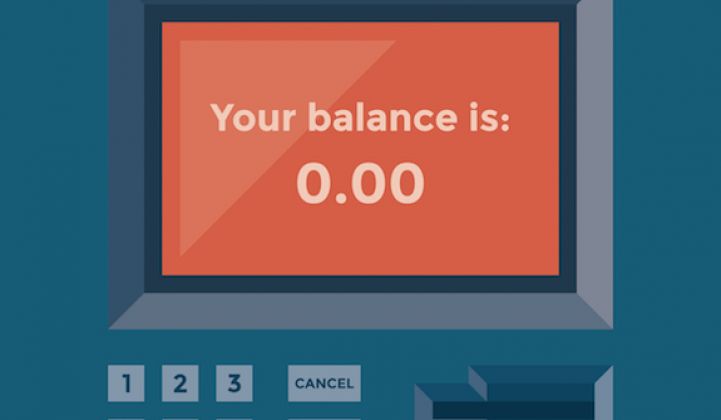In June of last year, residential solar specialist Sungevity was almost broke. But the company appeared to have found a white knight in the form of a reverse merger with Easterly Acquisition Corp -- a deal that valued the solar sales and customer-acquisition platform firm at $357 million.
Now, that deal is off -- and Sungevity is presumably back to almost broke.
According to an SEC filing, "On December 31, 2016, Easterly Acquisition Corp., a Delaware corporation (the “Company”), terminated the Agreement and Plan of Merger, dated as of June 28, 2016 and as amended (the “Merger Agreement”), by and among Sungevity, Inc., a Delaware corporation (“Sungevity”), the Company, Solaris Merger Sub Inc., a Delaware corporation, and Shareholder Representative Services LLC, a Colorado limited liability company, as a result of the merger contemplate by the Merger Agreement not being completed on or prior to December 30, 2016."
We covered the now-canceled deal here. There were certainly positive aspects to the merger, as pointed out by the experienced solar investors we interviewed about the transaction.
- Sungevity would have access to $200 million in capital as part of the deal.
- "The valuation was probably relatively good for them." Sungevity has seen down rounds and recaps. "So it was probably a bump on the last valuation."
- "This solves the real structural issue of having a large preferred shareholder base -- they all get converted to common [shares]."
However:
- "Being public as a microcap by itself is a terrible place to be. In general, this is a terrible way to go public. You don’t get to sell your story to a long-term shareholder base and don’t pick up any analyst coverage in the IPO process. If you knock it out of the park operationally, this can self-resolve, but the typical fact pattern is companies waste the money they raised in such a reverse merger and then can’t raise any additional capital since they don’t have any real shareholder base and no banks will touch them/underwrite a follow-on offering."
- "[Sungevity has] shown repeatedly that it can’t run the business at a profit, has consumed a massive amount of capital [despite] being 'capital-light,' and as a result has continuously been recapped."
And here's the kicker: despite talk of being EBITDA positive in 2017, an SEC document filed by the merger hopefuls showed that, absent this deal, Sungevity was about to run out of money. The company was burning about $15 million per quarter and laid off 250 employees in March of this year.
According to GTM Research analyst Nicole Litvak, "Sungevity's installations peaked in Q1 2016 and declined for the next two quarters. And even though the residential market as a whole is struggling, Sungevity's market share in Q3 (1.6 percent) was the lowest it's been since the beginning of 2013. It was 2.2 percent in Q1."
As we've reported, Sungevity raised $650 million in project finance and equity funding from private equity giant Apollo Global Management last year, with total investment of more than $850 million in VC and project financing from investors including home improvement store Lowe's and European utility E.ON.
Residential solar has shown incredibly strong growth in the last decade, but the profitability picture has been less sanguine. The top tier of solar companies remains a volatile and labile place to be doing business. Residential-facing solar firms such as SolarCity (acquired by Tesla), Vivint (almost acquired by now-bankrupt SunEdison), Verengo (acquired by Crius Energy), NRG and Enphase have all had to make major course corrections on growth plans and core businesses. Only Sunrun has managed to show profitability while managing its pace of growth.



